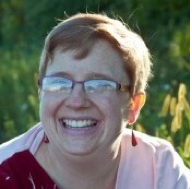“I think we are well advised to keep on nodding terms with the people we used to be, whether we find them attractive company or not.
Otherwise they turn up unannounced and surprise us, come hammering on the mind’s door at 4 a.m. of a bad night and demand to know who deserted them, who betrayed them, who is going to make amends.”
~ Joan Didion, Slouching Towards Bethlehem
One of the many forms I write is memoir—it is a very, very tricky form.
I have taken out my first journals—filled with details and rants and wants and jokes—from 1988 on. The 1988 journal is a Cabbage Patch Kids notebook, and I remember keeping it locked up so my older brothers wouldn’t read it. I was 11 years old. I wrote in it every few days.
By the time I got to ’91, ’92 (I was 13/14 years old), I wrote in my journal so many times a day that I often filled 10 pages with constant up-to-the minute reporting (during the summer, especially). When I didn’t have time to write, I would make notes in the margin to remind me of what to write about later, “Conversation with Mom,” “D’s beliefs on religion,” “pancakes,” etc.
I was feverish for Jesus, a recent Born Again convert, high on crushes and newly found lust for boys, and fiercely loyal to my few closest friends. And I was mean.
Yup. Mean. In my journals, I even call myself mean, evil, manipulative.
It is not self-criticism: it’s the truth. These were survival mechanisms, and socially sanctioned ones: it wasn’t just me, isn’t just me. Yet, it’s important for me to look at how I managed to both believe in Christianity and also act with such slyness.
Somehow, though it seems to contradict my fervent belief in God, I glorified my “evil”ness in my journals: “I know I am evil. I love it.” I didn’t mean an against-God kind of evil, but I did know that what I was doing—taking a ladder away from a house when a friend’s cheating boyfriend was up on the roof, playing with the heads of crushes and exes, lying up a storm to get what I want—was wrong.
I would do anything to get the love I needed, especially in the form I thought it would come: through affection, attention and a budding sexuality.
I have looked back over these journals in the past—this is not the first time I am reading them again. However, this time I am trying to look back with love. I have teenaged nephews now, two of them, and I have taught Middle School aged kids now on and off for a few years. I have a better sense than ever of how hard that time is.
I also have a better sense of how hard any time is for anyone. Life is hard. I mean that, in a sincere, real way. A lot of life is filled with struggle and intensity, stress and densely packed incidents. The only way, the main way, to lighten the load is compassion: for myself then, for myself now, and for all other beings.
The major block to my compassion is a fear of repetition: a fear that if I am compassionate towards that part of myself, it will receive my acceptance as an invitation to return. I also need to remind myself that what perpetuated that kind of attitude then was a cycle of constant self-judgment.
I need to have faith that I am who I am now, not who I was then, though she is still in there somewhere, and needs more than ever for me to accept her and wish for her that she suffer less and find resolution.
Not salvation. Rather, resolution. Compassion. Acceptance.
Watching a Pema Chodron talk lately, looking back with mindfulness at my current 36-year-old life, I know this to be true. Not just because I have read it, but because I have tried it, and it works.
This is what breaks the cycle of self-hate, of manipulation, of looking back with regret: compassion. Acceptance.
Whether it is about something I did yesterday or something I did 22 years ago, I cannot fix now what I did then, nor do I need to. However, I can open myself big enough to allow love for that self, too, who otherwise stays hiding deep inside me, terrified that if anyone sees her, they will know the real me and hate me.
When I feel whole, I can look back with love.
When I can look back with love, I feel more whole. Now that is a cycle I can keep feeding: one that has room for mistakes and also room for accepting mistakes and for doing things new ways all the time.
Want 15 free additional reads weekly, just our best?
Get our weekly newsletter.
Editor: Bryonie Wise

 Share on bsky
Share on bsky






Read 0 comments and reply